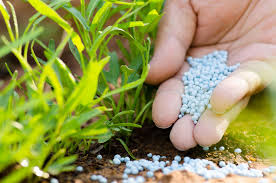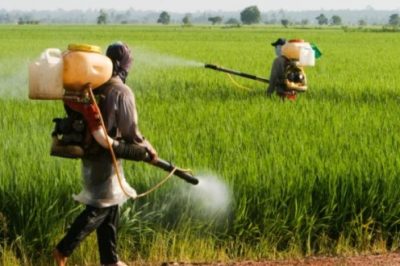An agrochemical or agrichemical is a chemical product that is used in agriculture. Agrochemicals are mostly pesticides which include insecticides, nematicides (chemicals used to kill roundworms) and herbicides. The term agrochemicals also contain hormones, synthetic fertilizers in addition to concentrated stores of raw animal manure. They are used in agriculture to facilitate the growth of plants and protect them.

Generally, most chemicals are toxic, so are agrochemicals. The overuse of these chemicals is affecting the environment. Due to the widespread use of agrochemicals, they are being manufactured in large quantities, and the bulk storage of such products may pose significant environmental risks in case of accidental spillage.
Due to the risks posed by these chemicals, their use has become highly regulated, and farmers require government-issued licenses for purchase and use, thus approved agrichemicals are the only ones used. In many countries, penalties may be incurred from agrochemical misuse, which includes improper storage that could lead to leakage, chemical spills, and chemical leaching.
Therefore the use of agrochemicals requires proper storage facilities and labeling; emergency clean up equipment and procedures; safety equipment and safety procedures for handling, application, and disposal.
Agrochemicals facilitate the growth of crops while protecting them from pests; they are also a danger to the environment where they affect the soil, water, and air. This is because they are used in large quantities, thus seeping into the surrounding lands and nearby water bodies. The excessive use of agrichemicals in farming generates a significant amount of residues, which lead to nutrient imbalance and quality reduction of agricultural produce. The reduced quality and nutrient imbalance cause long term ill effects on the health of the consumersi.e., the living organisms. For instance, asthma in human beings has been linked to pesticide residues in food. Agrochemicals have affected soil, water, and air in the following ways:
Effects on water.
- Agrichemicals in water diffusing with larger water bodies have led to the promotion of algae growth.
- Excess chemicals lead to the high richness of nutrients in water bodies causing a dense growth of plant life a condition known as Eutrophication
- Changethechemical properties of water.
- Make water unfit and unsafe for use.
Effects on the soil.
- Change pH in the soil.
- Death of helpful bacteria necessary for plants e.g., in legumes.
- Leads to an increase in nitrate content.
- Unnatural growth effects.
- Death of soil organisms.
Effects on air.

- Winds transfer polluted air to nearby areas, thus spreading their effects, causing drastic effects on the health of the surrounding organisms.
- Diffusion of pesticides with air alters their nature.